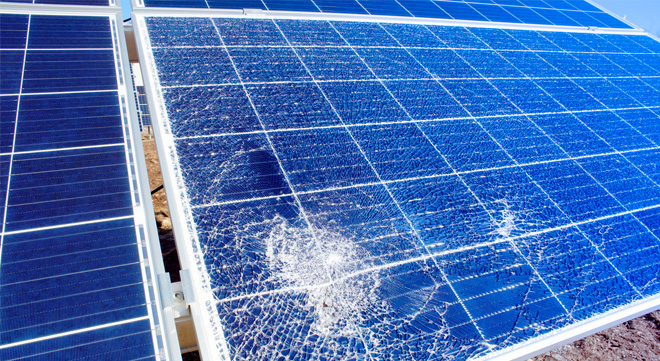Considering South Africa’s high crime rate, it won’t come as too much of a surprise if manufacturers of other goods begin to adopt an innovative technique aimed at discouraging thieves from stealing solar panels.
With an Eastern European company already producing solar panels with broken corners and cracked glass to make them less attractive to criminals in South Africa, who is to say that dented or cracked appliances won’t soon become all the rage?
Daily Investor earlier this week reported that a company was purposefully producing solar panels that looked damaged to deter criminals.
Theo de Jager, executive director of the Southern African Agri Initiative (SAAI) and founder of Son SA, shared this during an interview with Nuuspod, a podcast for news and current affairs in Afrikaans, presented by Izak du Plessis.
De Jager told Du Plessis that he had recently met with a company representative who showed him photos of the solar panels they export to South Africa.
“And every solar panel was damaged; a corner missing here or a crack there. I asked if they were second-hand. He said that is the way they make them; that there was nothing wrong with them. That they make them appear broken so that thieves would rather steal other solar panels,” he said.
Farmers hit hard
Son SA assists farmers in making the move to solar-powered electricity. He said the need for such a “mechanism” arose after SAAI received countless calls from farmers saying they could no longer make ends meet.
“We became really concerned about the number of farmers who said the electricity crisis had brought them to their knees. They could not afford to farm in the same way, to produce the same outputs while having to rely on a generator – it became too expensive.”
He said with Eskom not providing any solutions – and after conversations with partners National Employers’ Association of South Africa, Agri X, and the Transvaal Agricultural Union – it became evident that solar energy was the way forward.
Pooling their resources, the partners, together with a number of smaller organisations, founded Son SA just over a year ago. De Jager said they had been working flat out since then to help connect farmers with financers and reputable service providers. So far, about nine farms operate completely off the Eskom grid.
Finding financiers
At present, Son SA is focusing on bringing more financiers to the table. De Jager said although they had already secured a few from banks and non-bank financial institutions, more were needed.
He said when it came to funding options, there were quite a few to consider.
“Nowadays, you can rent solar power just like you would a cellphone. You do it on a contract basis, and you get the equipment as part of the contract. Or there are those who have someone else invest in their solar power, and then they basically pay the same as they would have paid Eskom. But it’s much more reliable, and those prices don’t keep on going up like Eskom’s costs do. Some prefer to invest in their own equipment. In this instance, they want a type of term loan.”
He said that although it was expensive to install solar power, it was even more expensive not to.
“It’s everyone’s fate. We all need to start becoming more independent from Eskom in some way. There is still no plan to replace everything that’s broken within Eskom. So, if you don’t do it now, you’ll probably be forced to do so in two or five years from now.”
On the bright side, he said the cost was starting to come down. As is the case with any new technology, in the beginning, it’s very expensive, and gradually, it becomes cheaper.
“Unfortunately, because we live in South Africa, the associated risk is also getting bigger and bigger. Over the past two-and-a-half months, the most common complaint we get from farmers is about theft – you can’t believe how common the theft of solar panels and batteries has become lately,” he said.
Solar panel theft
SAAI isn’t the only organisation to have noted the rise in the theft of alternative power source equipment.
In July, Wynand van Vuuren, client experience partner at King Price Insurance, told Moneyweb radio host Jeremy Maggs that the short-term insurer had seen an increase in solar panel theft, and it was likely to become worse.
Vodacom also recently shared that battery theft continued to have a serious impact on the mobile network industry, costing many of the country’s leading providers billions.
Earlier this month Charnel Hattingh, the head of communications and marketing at Fidelity Services Group, told Moonstone Information Refinery that, based on the incidents to which the security solutions provider had responded, solar panels and batteries were popular targets for criminals.
Read: Some insights on insuring solar panels against theft
Hattingh said tag technology was being investigated and deployed in the agricultural environment to link a panel to its buyer or owner.
“The idea would be to do a communication grid as well, and as these panels are being moved past these technology readers or gateway points, they would be monitored in control rooms with software for despatching and recovering the devices. It would be a way to make sure the panel becomes inoperable, should the security tag be removed,” Hattingh says.



